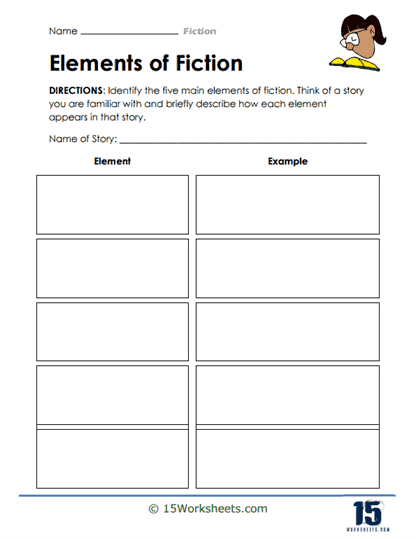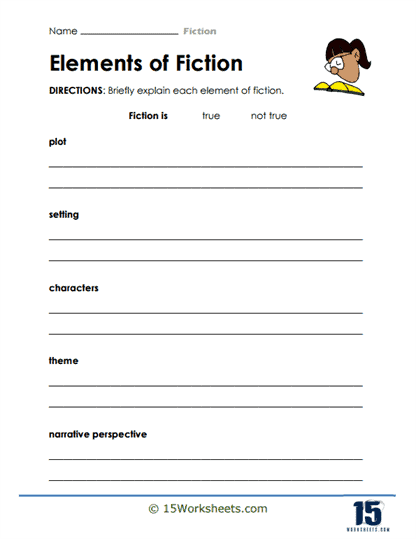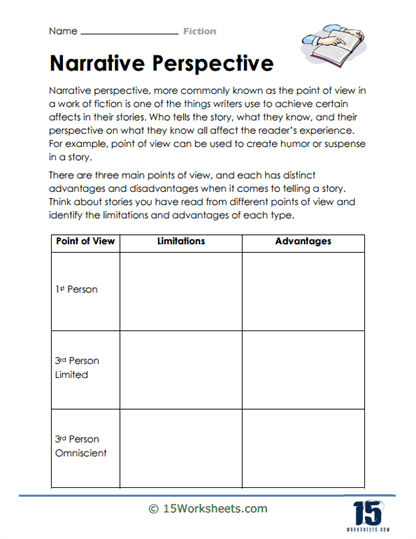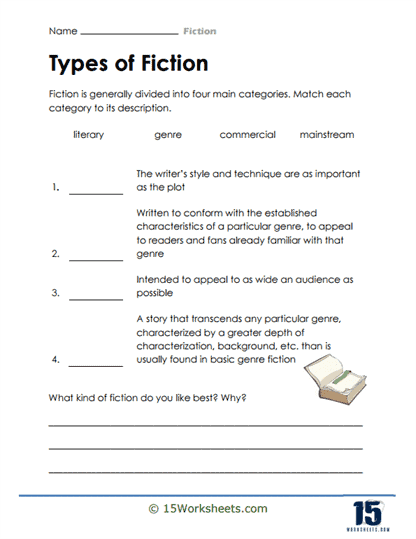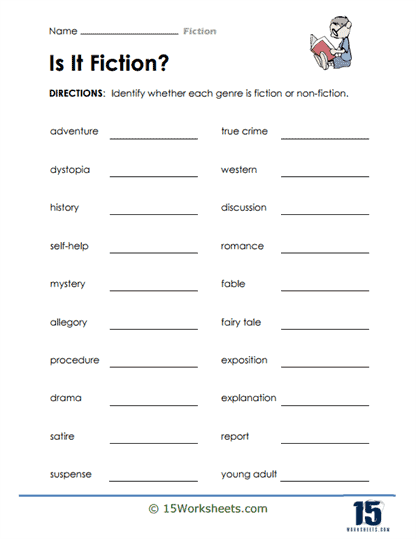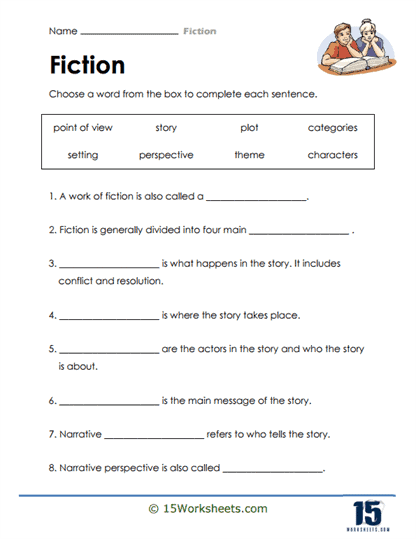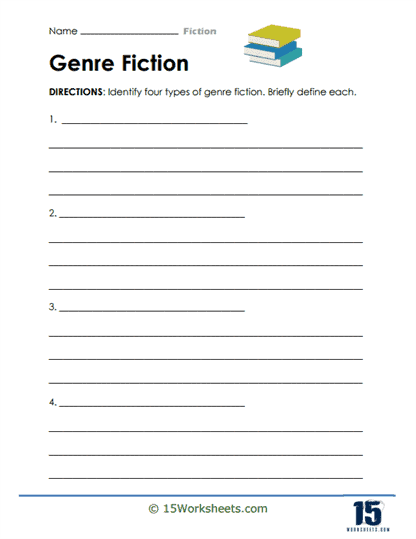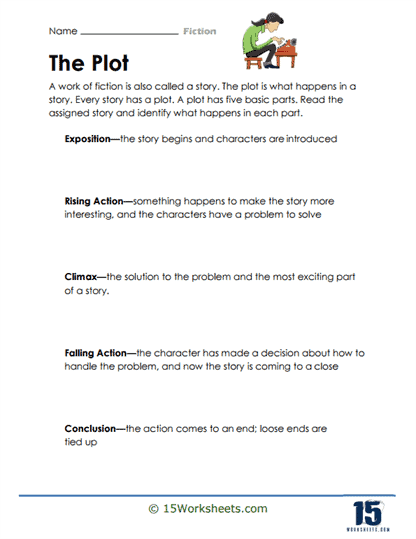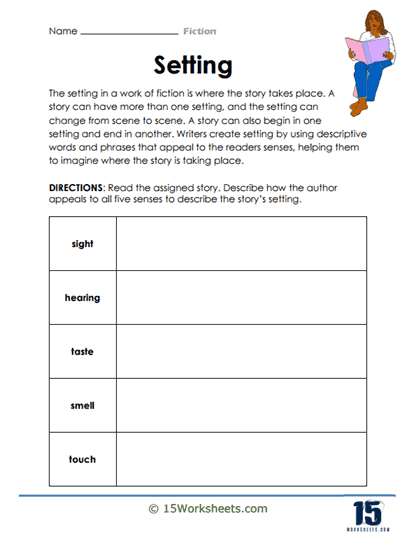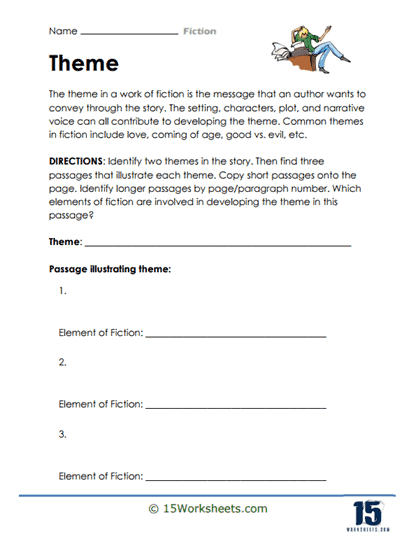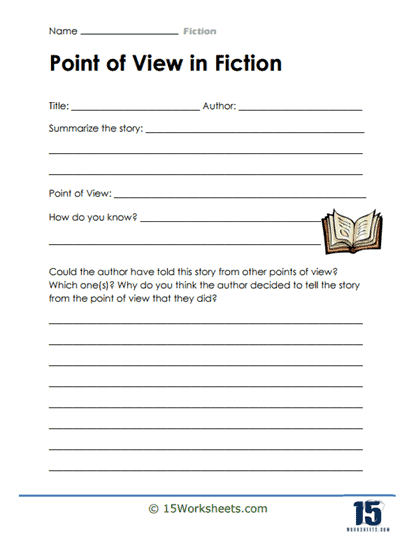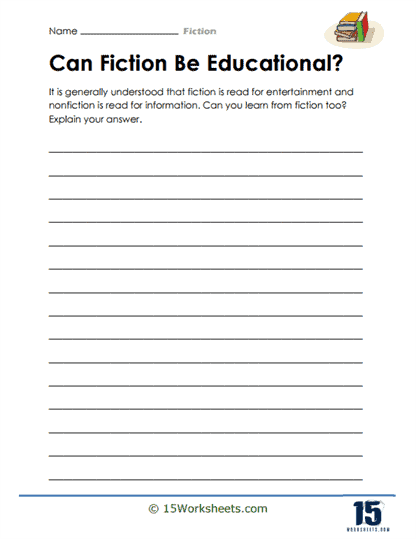Fiction Worksheets
All About These 15 Worksheets
Fiction, with its boundless creativity and storytelling magic, has the power to transport readers to worlds both familiar and fantastical. This Fiction Worksheets Collection is a comprehensive resource designed to help students unravel the intricacies of fiction and develop a deep appreciation for the genre.
This collection comprises 15 meticulously crafted worksheets, each dedicated to exploring different aspects of fiction, from character development to narrative techniques. In this description, we will delve into the importance of studying fiction and the myriad benefits it offers to students.
What is Fiction?
Fiction is a literary genre that encompasses stories, narratives, or works of literature that are primarily the product of the author’s imagination rather than being based on real events or factual accounts. In fiction, authors create characters, settings, and plots that may be entirely invented or inspired by elements of reality but are ultimately fictional and created for artistic, entertainment, or thematic purposes.
Key characteristics of fiction include:
- Imagination: Fictional works are born from the author’s imagination, allowing them to craft unique and creative worlds, characters, and situations.
- Narrative: Fiction often tells a story, whether it’s a short story, novel, play, or screenplay. These narratives can vary widely in terms of genre, style, and structure.
- Characterization: Authors develop characters in fiction, giving them distinct personalities, motivations, and qualities. Readers often become emotionally invested in these characters’ journeys.
- Settings: Fictional stories are often set in imaginary or fictional locations, but they can also take place in real-world settings with fictionalized elements.
- Plot: Fictional narratives typically feature a plot with a beginning, middle, and end. These plots can include conflicts, challenges, and resolutions that drive the story forward.
- Exploration of Themes: Fiction allows authors to explore themes, ideas, and issues relevant to the human experience. These themes may be symbolic or allegorical, offering deeper insights into society, culture, and life.
- Freedom of Expression: Fiction offers authors the freedom to experiment with language, style, and narrative techniques, making it a versatile and expressive form of literature.
Fiction encompasses a wide range of genres, including but not limited to literary fiction, science fiction, fantasy, mystery, romance, historical fiction, and more. Each genre has its own conventions and characteristics, allowing authors to cater to different tastes and interests.
Overall, fiction serves as a powerful medium for storytelling, entertainment, exploration of human nature, and the communication of ideas and emotions. It invites readers into imaginative worlds and encourages them to connect with characters and themes on a personal and emotional level.
The Importance of Fiction For Students
Fiction is more than just escapism; it is a window into the human experience and a mirror reflecting the complexities of life. Here’s why studying fiction is essential for students:
- Empathy and Perspective: Fiction introduces students to characters from diverse backgrounds and experiences, fostering empathy and a broader worldview. Readers can step into the shoes of characters and gain new perspectives.
- Critical Thinking: Analyzing fiction requires critical thinking as students evaluate plot intricacies, character motivations, and thematic developments. They learn to question, analyze, and synthesize information.
- Literary Appreciation: Studying fiction enhances literary appreciation by allowing students to explore the artistry of narrative construction, character development, symbolism, and figurative language.
- Cultural Understanding: Fiction often delves into cultural, historical, and societal contexts. Students can gain insight into different time periods, regions, and social issues through fiction.
- Language Proficiency: Engaging with fiction improves language proficiency, vocabulary, and comprehension skills, which are valuable in both academic and professional settings.
- Imagination and Creativity: Fiction stimulates imagination and creativity, encouraging
These Fiction worksheets empowers students to navigate the vast landscape of fiction with confidence and curiosity. Beyond enhancing their comprehension of the genre, these worksheets foster critical thinking, empathy, and a deep appreciation for the power of storytelling.
As students engage with diverse works of fiction, they develop the capacity to analyze narratives, evaluate character motivations, and appreciate the rich tapestry of human experiences. These skills not only prepare them for academic success but also cultivate their creativity, empathy, and analytical thinking.
Empower your students to explore the world of fiction with enthusiasm, becoming not only well-read individuals but also more empathetic, imaginative, and culturally aware thinkers who carry the magic of fiction with them throughout their lives. Unlock the doors to literary exploration and critical understanding, one story at a time, and watch as your students become more engaged, enlightened, and enthusiastic learners.

